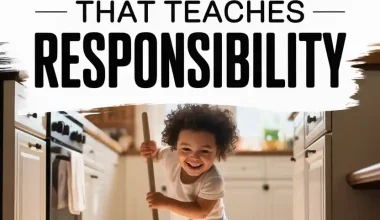You think you’re ready. You survived the toddler tantrums, the primary school years, and even that incident involving glitter and the dog.
Then one day, your sweet child is suddenly taller than you, sweating at odd times, and rolling their eyes with Olympic-level skill.
Welcome to raising teens — the stage no one quite warns you about (at least, not in the fine print).
Teenage Logic is an Alternate Universe
Some days, you’ll swear your child is conducting a complex psychological experiment, just to see if your head actually explodes.
You’ll ask a question (“Did you clean your room?”) and receive answers that defy logic (“I was going to, but then I thought about it, and now I’m tired.”).
Don’t expect direct communication. Texts might consist of emojis, and “I dunno” can mean anything from “I forgot” to “I definitely know, but I’m not telling you.” Try not to take it personally.
According to psychologists at the Child Mind Institute, teens’ brains are a construction zone, making communication a bit… bumpy.
You’ll need new strategies. Open-ended questions. Car rides where you face forward and don’t make eye contact (apparently that’s less threatening).
Never underestimate the power of a midnight snack to coax out a real conversation.
Mood Swings Have Mood Swings
You may fondly recall toddler meltdowns over the wrong colour cup. Well, teens have opinions on just about everything, and the stakes feel much, much higher.
The right look from a peer (or a stranger on the internet) can send them soaring or crashing.
Hormones are definitely on the guest list, but that’s not the whole story. Teens are wrestling with identity, independence, and a world that feels both too big and impossibly small.
One minute they want advice; the next, you’re accused of ruining their life for suggesting a jacket.
A little humour never hurts. (“Ah, you’re channeling your inner soap opera star—can I get your autograph?”) Empathy, patience, and a decent supply of snacks help too.
Some days, the best you can do is just weather the storm together.
The Social Life is a Full-Time Job… For You
No one mentioned that you’d become a ride-share driver, a party planner, and a detective, all rolled into one.
Suddenly, your calendar is filled with events that are “absolutely essential” but details are on a need-to-know basis, and apparently you don’t need to know.
Social media adds another twist. Your teen’s phone is their lifeline — for better and worse.
Friendships now stretch across continents and time zones. Every group chat can feel like a high-stakes negotiation.
If you don’t know what a “Snapstreak” is, prepare to be educated (or dismissed for being hopelessly out of touch).
You aren’t required to know all the lingo or apps. Try to stay curious without snooping.
Research from Common Sense Media shows parental interest and open dialogue make a big difference in helping teens navigate their online world safely.
Sleep Schedules: Prepare for Jet Lag
Those warnings about teens needing more sleep? Very real. What they don’t tell you is that this sleep arrives in random bursts between midnight and noon — on weekends only.
On school days, you’ll be dragging a groggy, grunting creature out of bed before sunrise.
It’s not laziness; it’s biology. The Sleep Foundation explains that teenagers’ circadian rhythms naturally shift later, making early mornings feel punishing.
Try gently nudging schedules, but don’t expect miracles.
If you’re lucky, you might get more silence in the mornings. Enjoy it. Make coffee. Maybe even get five minutes to yourself — assuming the fridge hasn’t been emptied overnight.
Every Argument Feels Like a Supreme Court Case
Suddenly, every rule is up for debate. Curfews, chores, screen time — nothing is sacred.
Your teen may present a 12-point dissertation on why they shouldn’t have to unload the dishwasher, complete with precedent and closing arguments.
This isn’t just rebellion for rebellion’s sake. Teens are learning to assert themselves, think critically, and push boundaries.
As exhausting as it is, these arguments can help them flex essential life skills.
Set clear expectations, but allow room for negotiation now and then.
If they present a well-reasoned case, it’s okay to yield — sometimes. Just don’t expect a “thank you.” That’s asking for the moon.
Your Own Teen Years Are Both Ancient and Embarrassing
You’ll be tempted to share stories of your own misspent youth. Maybe you danced to ABBA or wore questionable hairstyles.
Be warned: to your teen, anything that happened before 2019 is the Stone Age. Any anecdote from your own adolescence is either embarrassing or irrelevant. Or both.
That said, sharing a little vulnerability can go a long way. If you admit to not having it all figured out at 15, you may get a rare, genuine smile. Or at least a less dramatic eye roll.
And if your fashion choices in 1997 resurface in today’s trends? Well, you’re officially “vintage cool.” (Just don’t say it out loud.)
The House Will Be a Revolving Door
Friends will appear and disappear at dizzying speed.
You might wake up to find three extra bodies in your lounge, all watching Netflix and polishing off your snacks. Names will blur. Personalities will change weekly.
Hosting is tiring, but it lets you keep an eye on the crowd. The best listening happens when you’re just present, doing something mundane. (Baking a dozen frozen pizzas, for instance.)
Encourage your teen to open up your home to their friends, within your comfort zone. Being the house with the “good snacks” is a small price for glimpsing who they’re becoming.
Independence Grows… and So Does Your Worry
Watching your child spread their wings is both beautiful and terrifying. They want to walk home with friends, take the train, or go to concerts.
Your job is to look calm while internally panicking and tracking their location on your phone.
This is where trust is built brick by brick. Give them space, but stay just close enough to catch them if they stumble.
The American Academy of Pediatrics encourages gradually increasing independence while keeping communication open.
Mistakes will happen. That’s part of growing up — for both of you.
Big Feelings About Small Stuff
The intensity of teenage emotions can catch anyone off guard.
A forgotten lunch can feel like the end of the world. A compliment from a peer can make their whole week. Your offhand remark about their hair might live in infamy.
Teens are experiencing many “firsts” — crushes, disappointments, triumphs, heartbreaks. Their reactions may seem outsized, but it’s real to them.
You don’t have to solve everything. Sometimes, listening is the best gift you can offer.
Pass the tissues, nod sympathetically, and resist the urge to fix. So much of parenting teens is simply being the safe place they can fall apart.
You’ll Laugh, Cry, and Google Everything
You will be baffled by slang. You will worry about exams. You will sneak chocolate in the pantry, wondering if you’re getting any of this right.
Every family has bumps and blow-ups.
There will be moments of pure magic, like hearing your teen’s unguarded laugh, watching them stand up for a friend, or seeing a glimpse of the adult they’re becoming.
You’re not alone. Every parent with teens is making it up as they go, doing their best — and occasionally hiding in the loo just for some peace.
What No One Warned Me — But I Wouldn’t Trade It
Here’s the secret: raising teens is a mess and a marvel, often in the same day.
You’ll question your sanity and marvel at their resilience. You’ll wish for quiet and then miss the noise when they’re gone.
Nothing can fully prepare you. But you’re exactly who your teen needs — even if they’d never admit it.
And if all else fails, there’s always chocolate.




